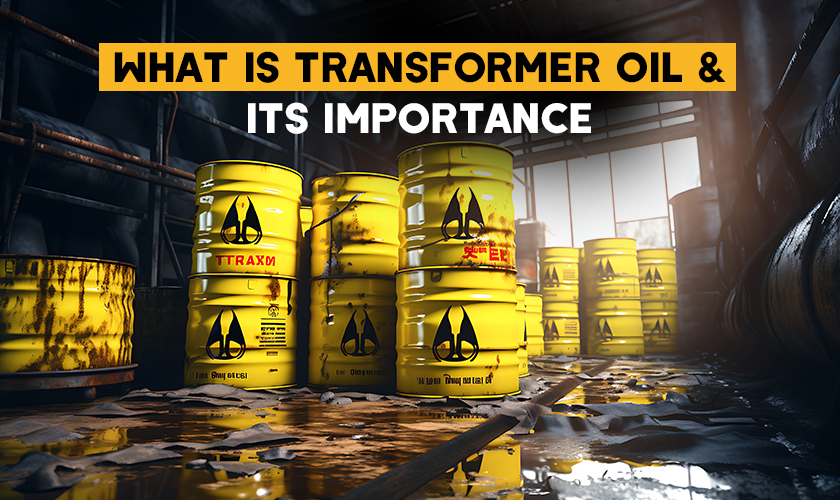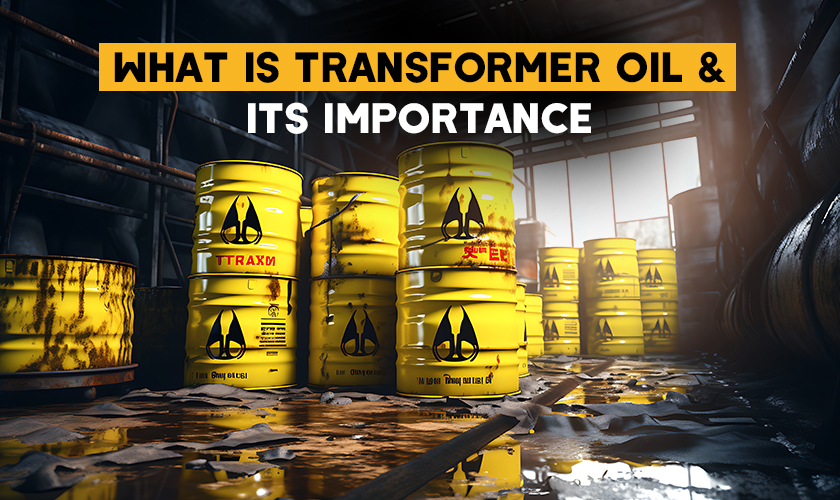Transformer oil, also known as insulating oil, has a crucial role in transferring electrical strains from one power circuit to another. This helps in the efficient functioning of the transformers. This oil is used in the transformers during the change of power from high to low or vice-versa.
Acting as both an insulator and coolant, transformer oil is crucial for maintaining the integrity and performance of these transformers.
In this article, we will briefly discuss the testing, types, and properties of this essential component.
What Exactly is Transformer Oil?
Transformer oil is a special oil type with exceptional electrical insulating properties and stability at high temperatures. It acts as a barrier between the possible reaction of cellulose and atmospheric oxygen. It serves multiple functions within electrical power transformers:
Insulation: Helps to prevent arcing and corona discharge.
Coolant: It dissipates heat generated by the transformer.
Preservation: Protects the core, windings, and cellulose insulation from oxidation.
Transformer oil level is typically measured with the help of a Magnetic Oil Level Gauge (MOG).
Types of Transformer Oil
Transformer oil is available in two main types:
Paraffin-based: Lower oxidation rate, but can form insoluble sludge.
Naphtha-based: More susceptible to oxidation but the sludge that forms is soluble and minimises obstruction of the cooling system.
Even though both types of transformer oil have advantages and disadvantages, paraffin-based oils are still widely used, especially in India.
Properties of Transformer Oil
Transformer oil has some selective properties that help to determine its serviceability. Based on some parameters it can be divided into three -
Electrical Properties: It includes dielectric strength, constant resistance, and dielectric dissipation factor.
Chemical Properties: More susceptible to oxidation but the sludge that forms is soluble and minimises obstruction of the cooling system.
Physical Properties: It contains interfacial tension, viscosity, flash point, and pour point.
Even though both types of transformer oil have advantages and disadvantages, paraffin-based oils are still widely used, especially in India.
Why Transformer Oil Testing Matters
Transformer oil testing is a process of reassurance that it is suitable for today’s standards or not. Also, testing transformer oil helps to ensure its efficacy and longevity. Measurement of the breakdown voltage, acid number, specific resistance, corrosive sulphur, LPF or liquid power factor and interfacial tension are performed while testing.
These tests help identify any issues such as contamination or degradation, allowing for timely intervention and maintenance. Also, it's important to know the difference between normal and excessive gas ratings.
Common Problems Identified Through Testing
Issues like arcing, corona discharge, overheated cellulose, and overheated oil can be detected through testing. Understanding these problems enables prompt action to prevent further damage and ensure optimal transformer performance.
The Importance of Transformer Oil Testing
Transformer oil testing is vital for:
Determining Electrical Properties: Ensuring the oil meets necessary electrical properties.
Identifying Suitability: Assessing if the oil is fit for continued use.
Detecting Maintenance Needs: It highlights the need for regeneration or filtration.
Cost Reduction: Minimising expenses on oil replacement and equipment failure.
Enhancing Safety: Preventing untimely failures and maximising operational safety.
With proper testing, transformer oils can last for up to 30 years, saving significant costs in the long run.
Conclusion
Transformer oil is a critical component in electrical power transformers, and its testing is paramount for ensuring efficiency, safety, and longevity. By understanding its types, properties, and the importance of testing, we can effectively maintain transformer health and optimize performance.
For expert guidance on transformer oil testing and maintenance, contact Makpowerts today!






